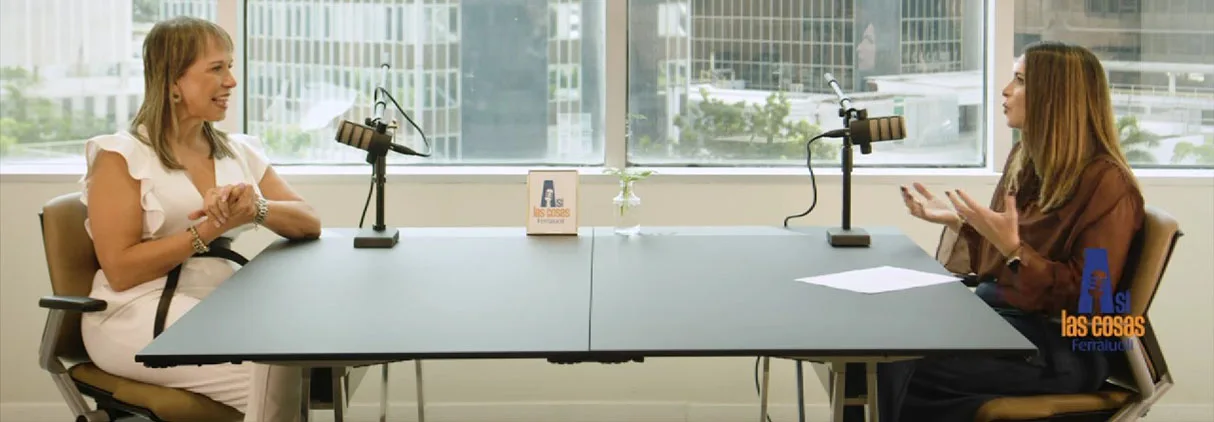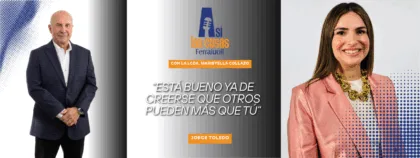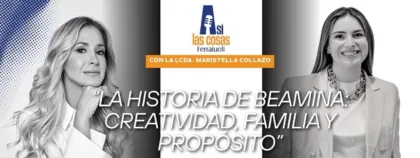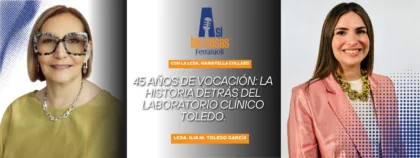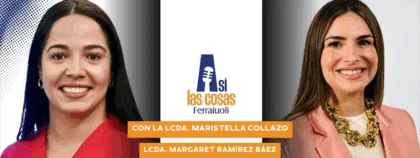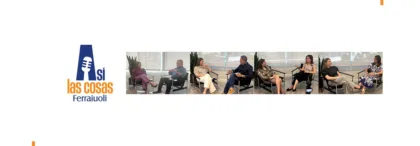In this powerful episode of Así Las Cosas, Ferraiuoli’s podcast series hosted by Maristella Collazo-Soto, Capital Member and Co-Chair of the Intellectual Property Practice Group, we dive deep into a story of courage, resilience, and breaking barriers. Katherine González Valentín, Partner and Director of Ferraiuoli’s Labor and Employment Department, shares her extraordinary journey as Ferraiuoli’s first female partner, first woman on the executive committee, and a trailblazer who has redefined what it means to balance motherhood with leadership in Big Law.
The Foundation: Values That Shape a Leader
Katherine González-Valentín defines herself through characteristics that have guided her remarkable career: optimism, courage, and diplomacy. These traits didn’t emerge by chance—they were cultivated by parents who instilled in her the belief that anything is possible when approached with the right mindset and determination.
Her journey into law wasn’t predetermined. After studying advertising and marketing at Duquesne University in Pittsburgh—where she immersed herself in American culture and honed her public speaking skills—Katherine initially envisioned a career as an account executive. Those four years were transformative, teaching her the creative and communication skills that would later become her signature strengths in legal practice.
When she returned to Puerto Rico to study law at Universidad Interamericana, labor law immediately captured her attention. The appeal wasn’t just the legal framework—it was the human stories behind each case, the narratives of employees and employers navigating complex workplace relationships. Before “storytelling” became a business buzzword, Katherine recognized that labor law was fundamentally about understanding and communicating people’s experiences.
A Destiny Written in Serendipity: Joining Ferraiuoli
Katherine’s path to Ferraiuoli reads like a story of perfectly timed connections and professional destiny. Working at one of Puerto Rico’s largest law firms early in her career, she had a chance encounter in a hallway that would change her professional life forever. She recognized Eugenio Torres, now Ferraiuoli’s Managing Partner, from high school. He didn’t immediately remember her, but what followed was one of the most meaningful professional friendships and partnerships of her legal career.
Building a Department, Creating a Legacy
Katherine arrived at Ferraiuoli approximately eight years after its founding. The firm was still growing, much smaller than its current size, and undergoing significant transitions. Her motto upon arrival captured her approach perfectly: “I came to roll up my sleeves.”
Before officially starting, Katherine conducted one-on-one meetings with every attorney in the firm. This wasn’t a traditional interview process—it was a listening tour. She wanted to understand what each professional wanted from their career, where their passions lay, and how they envisioned their future at Ferraiuoli. This approach revealed her leadership philosophy: teams thrive when people are engaged in work that excites them and feel genuinely heard by their leaders.
During her early years, she simultaneously managed the labor department and temporarily oversaw litigation when that department’s director departed. She worked on intellectual property matters with Maristella, handled appeals (including a memorable trip to Texas for an appellate argument), and immersed herself in every aspect of the firm’s practice.
Breaking Barriers: First Female Partner, First Woman on Executive Committee
Katherine made history at Ferraiuoli as the first female partner and the first woman to serve on the firm’s executive committee. These weren’t merely ceremonial titles—they were meaningful milestones that opened pathways for other women in the firm and demonstrated that leadership wasn’t limited by gender.
When asked how she reflects on these historic moments, Katherine’s response is characteristically humble: many things happened naturally. She didn’t campaign for recognition or demand a seat at leadership tables. Instead, she focused intensely on being exceptional at her work, supporting the attorneys around her, and building a practice that clients valued.
Her philosophy was clear: “I couldn’t grow if I didn’t see the people around me happy, passionate about their work, and developing their skills.” This approach to leadership—where personal success is inextricably linked to team development—created a culture within the labor department that attracted talent and fostered loyalty.
Becoming a Mother at 46: The Greatest Professional Challenge
For much of her life, Katherine dreamed of having multiple children—three or four, she imagined. Life, however, had different plans. As the years progressed and she remained unmarried, she faced a difficult reality: traditional paths to motherhood might not be available to her.
At 46, Katherine made one of the most courageous decisions of her life. She explored medical alternatives that could help her become a mother and embarked on a journey that would transform both her personal life and her professional identity.
On January 27, 2018—her birthday—Katherine was in New York delivering a conference presentation. During that trip, she took a pregnancy test that came back positive. This wasn’t just any birthday gift; it was the fulfillment of a long-held dream and the beginning of a new chapter that would test every aspect of her resilience and determination.
On September 20, 2018, her daughter Stella Lorne was born. Katherine’s life had changed fundamentally—and so had her perspective on what was possible in combining motherhood with a demanding legal career.
Artificial Intelligence: Transformation and Opportunity in Employment Law
As Maristella points out in the episode, when Katherine began practicing, social media was the disruptive technology everyone was discussing. Today, that role belongs to artificial intelligence—and its impact on employment law is both profound and rapidly evolving.
AI is already transforming talent management. Large employers use AI-powered systems to screen résumés, conduct initial candidate interviews via chatbots, analyze video interviews for desirable characteristics, and predict which candidates will succeed in particular roles. These technologies can process thousands of applications quickly and, theoretically, make more objective decisions than human reviewers subject to unconscious bias and fatigue.
Employees, too, are adopting AI tools—often without their employers’ knowledge or approval. Surveys indicate that substantial percentages of workers use ChatGPT and similar platforms to draft emails, summarize documents, and complete routine tasks more efficiently. For tech-savvy employees, AI has become an indispensable productivity tool.
However, this enthusiasm must be tempered with awareness of significant risks. Katherine identifies several critical concerns that employers must address:
- Confidentiality and Privacy Breaches: An HR professional who inputs an employee’s full name, social security number, and performance concerns into ChatGPT has just disclosed confidential personal information to a third-party platform. Without proper training, well-intentioned employees can inadvertently violate privacy laws and company policies.
- Intellectual Property Violations: AI systems that generate content by learning from copyrighted materials can expose employers to infringement claims. An employee who uses AI-generated text without understanding its sources could commit copyright violations that create company liability.
- Trade Secret Exposure: Proprietary business information entered into AI platforms may be stored and potentially accessed by competitors or used to train models that benefit others.
- Algorithmic Bias: AI systems trained on historical data can perpetuate and even amplify existing discriminatory patterns. A résumé screening tool might systematically exclude qualified candidates based on protected characteristics—gender, age, ethnicity—because the training data reflected past biases. When these patterns aren’t detected and corrected, employers face discrimination liability under federal and local employment laws.
- Hallucination and Misinformation: AI can confidently present false information—what’s known as “hallucination”—that, if relied upon without verification, can lead to serious legal errors. Katherine notes that courts have already sanctioned attorneys who submitted briefs containing AI-generated fake case citations. In employment matters, relying on inaccurate AI outputs could result in unlawful terminations, policy violations, or strategic mistakes.
So what should employers do? Katherine recommends a comprehensive approach:
- Conduct AI Audits: Regularly assess what AI tools are being used across the organization, how they’re being used, and what risks they present. Audit vendors’ systems to ensure they don’t perpetuate discrimination or violate privacy requirements.
- Implement Clear Policies: Develop written policies that specify which AI tools are approved, how they should be used, what information can and cannot be input, and what verification procedures are required before relying on AI outputs.
- Require Human Oversight: AI should augment human judgment, not replace it. Critical decisions—hiring, promotions, terminations, performance evaluations—must retain meaningful human review that can identify errors and ensure fairness.
- Provide Training: Employees at all levels need education about AI capabilities, limitations, and proper usage. HR professionals and managers require specialized training on avoiding discrimination and privacy violations when using AI in employment decisions.
- Establish Accountability: Policies should clearly define consequences for misusing AI in ways that expose the company to legal or reputational risk.
Katherine emphasizes that the goal isn’t to avoid AI—that would be professionally irresponsible as competitors adopt these tools. Instead, employers must implement AI strategically and responsibly, with robust safeguards that protect both the organization and its workforce.
She also addresses a concern many workers share: will AI eliminate jobs? Katherine believes AI is best understood as a complement to human work rather than a replacement. While certain routine tasks will be automated, the qualities that make humans valuable—emotional intelligence, empathy, creativity, judgment, and relationship-building—cannot be replicated by algorithms.
Lessons in Resilience: Advice for the Next Generation
When Maristella asks what advice Katherine would give her younger self, the question becomes emotional. After a thoughtful pause, Katherine offers wisdom that reflects her journey:
“Live with passion and pursue what truly excites you.” Katherine’s career has been fueled by genuine passion for employment law, for advocacy, for developing others, and for breaking barriers. When work aligns with authentic passion, the long hours and hard challenges become meaningful rather than draining.
Why This Conversation Matters
This episode of Así Las Cosas transcends typical career discussions to explore the full complexity of building a meaningful professional life while honoring personal values and relationships. Katherine González Valentín’s story offers validation for anyone who has faced setbacks, chosen unconventional paths, or wondered whether their dreams were realistic.
For women contemplating motherhood while building demanding careers, Katherine’s journey provides both honest acknowledgment of the challenges and inspiring evidence that thriving is possible with the right support, determination, and willingness to create unconventional solutions.
For young attorneys with early career pressures, Katherine’s evolution from an associate working every weekend to a leader who advocates for wellness and sustainable practice offers hope that the profession can change and that individual attorneys can influence that change.
For anyone who has experienced a “door closing”—a job offer withdrawn, a promotion denied, a relationship ending—Katherine’s story of unexpected opportunities that arrived through apparent disappointments offers perspective that immediate setbacks may be redirections toward better outcomes.
Ferraiuoli’s Commitment to Breaking Barriers
Katherine’s journey reflects Ferraiuoli’s broader commitment to creating an environment where diverse talent can thrive and reach leadership positions. As one of Puerto Rico’s premier full-service law firms, Ferraiuoli distinguishes itself not merely through legal excellence but through intentional culture-building that values people’s full identities.
The firm’s recognition that attorneys like Katherine—bringing unique experiences, perspectives, and strengths—enhance client service and organizational success has created pathways for other professionals to envision their own futures as leaders. Katherine’s presence as a female partner, committee member, and department director sends a clear message: leadership at Ferraiuoli isn’t limited by traditional barriers.
Her advocacy within the firm for wellness initiatives, flexible work arrangements, and open communication about work-life balance challenges reflects Ferraiuoli’s willingness to evolve with the profession’s changing expectations and its commitment to sustainable excellence.
Watch and Learn More
Experience Katherine’s complete story by watching the full episode in Spanish on Ferraiuoli’s podcast series. Her candid reflections on courage, motherhood, professional resilience, and creating positive workplace cultures offer valuable perspectives for legal professionals, business leaders, working parents, and anyone interested in building careers aligned with personal values.
Related Resources
YouTube Channel: Así las cosas, por Ferraiuoli
Read Also:Verónica Nolla on Authenticity, Resilience, and Thriving as a Young Attorney in Big Law
Laura Torres on Legacy, Courage, and Family-Centered Succession Planning
